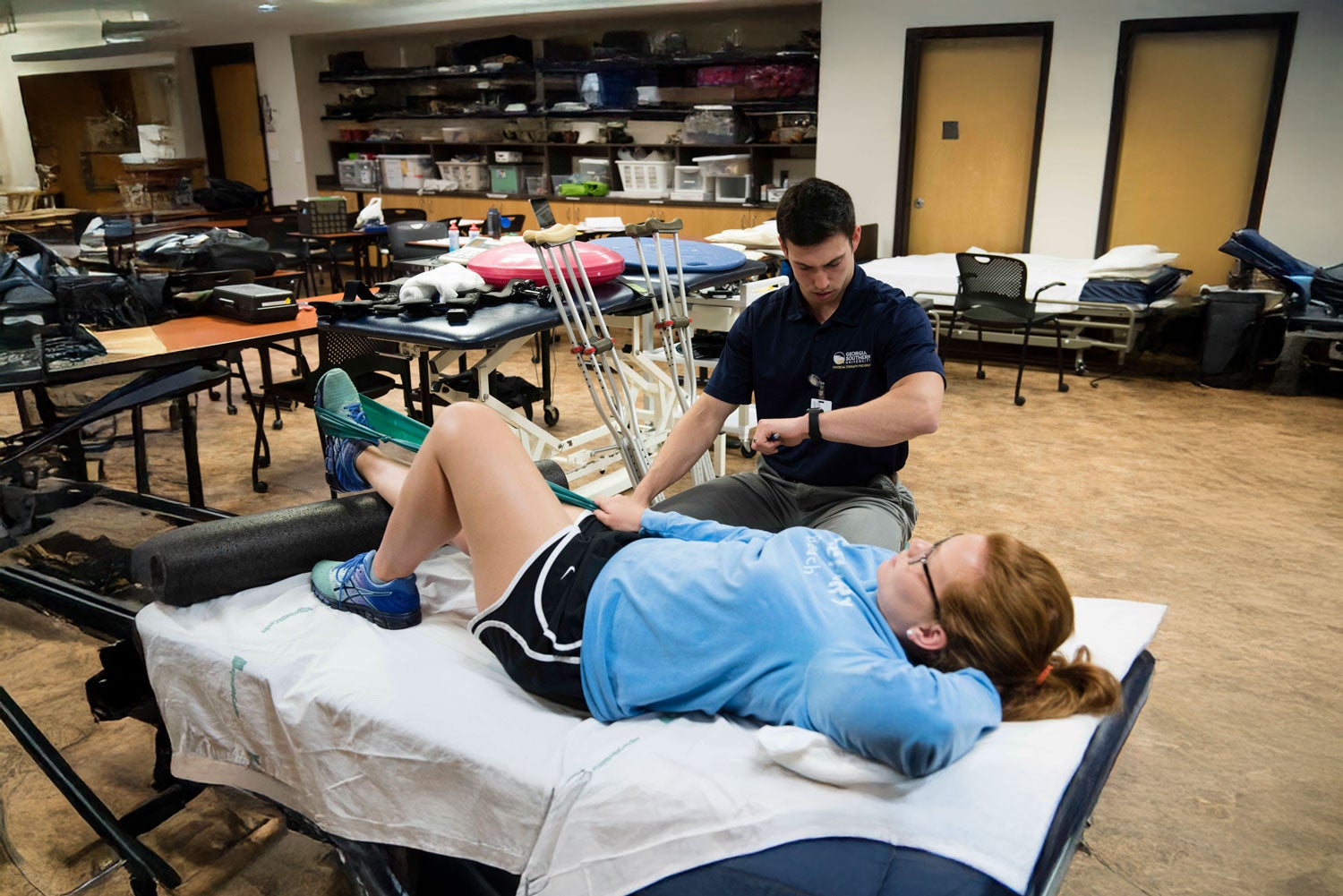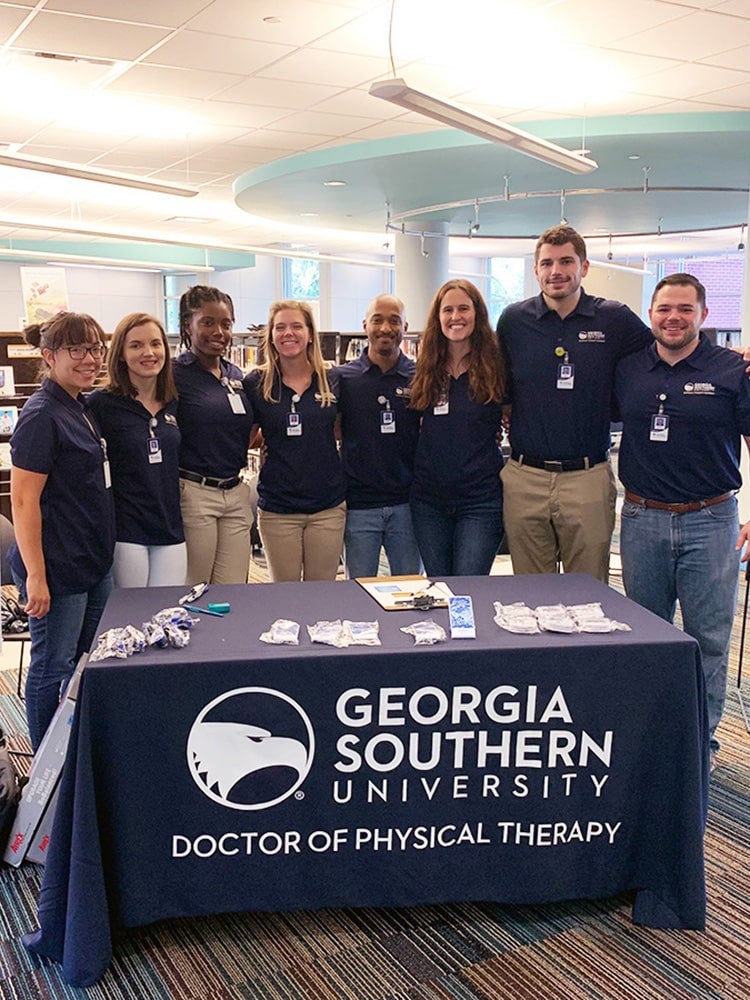Empower others to maintain or regain mobility and unlock healthier, happier lives with a Doctor of Physical Therapy (DPT) from Georgia Southern University.
Locations
- Armstrong Campus (In Person)
Why Earn a DPT at Georgia Southern?
- Graduate eligible to take the NPTE and apply for licensure.
- Qualify to apply for licensure in any state.
- 100% of graduates employed as physical therapists within one year of licensure.
- 99% NPTE pass rate.
- 134 credit hours to completion.
Georgia Southern’s innovative DPT program combines systems-based and lifespan approaches for an in-depth understanding of the diseases and disorders affecting movement and the evidence-based clinical methods to treat them. The immersive curriculum includes 32 weeks of full-time clinical practice plus additional experiences that strengthen your competence across a range of patient populations and presenting issues.
Training also includes the application of evidence-based practices and the latest research, equipping you to stay at the forefront of the profession as a lifelong learner.
This holistic perspective paves the way to a rewarding career in physical therapy — starting with outstanding National Physical Therapy Examination (NPTE) pass rates and leading to professional placements enjoyed by our graduates.
Ready to Apply?
Or, you can:
What Can You Do With a DPT?
Earning your Doctor of Physical Therapy qualifies you to take the National Physical Therapy Examination and apply for state licensure, opening the door to a career as a licensed physical therapist. In this rapidly growing field, you’ll find opportunities to serve in a wide variety of practice settings.
Where our graduates work:
- Hospitals
- Nursing homes
- Physical therapy clinics
- Private practices
- Rehabilitation centers
- Schools
What our graduates do:
- Geriatric physical therapist
- Neurological physical therapist
- Orthopedic physical therapist
- Pediatric physical therapist
- Physical therapist
What You’ll Learn
In your first year, you’ll explore the body’s musculoskeletal, cardiopulmonary, neuromuscular and integumentary systems in depth while studying the details of the diseases and disorders affecting them. Then, three clinical practicum courses provide further preparation and let you see how these concepts apply to recovery and rehabilitation.
In your second and third years, a more advanced approach to movement issues is organized by lifespan, focusing sequentially on movement disorders affecting patients from childhood into older adulthood.
In year three, two 12-week clinical placements advance your clinical skills even further in preparation for licensure and independent professional practice.
See the CurriculumBuild Your Experience
Moving from observation to direct provision of patient rehabilitation, extensive clinical experiences complement your studies and prepare you to enter the profession with confidence.
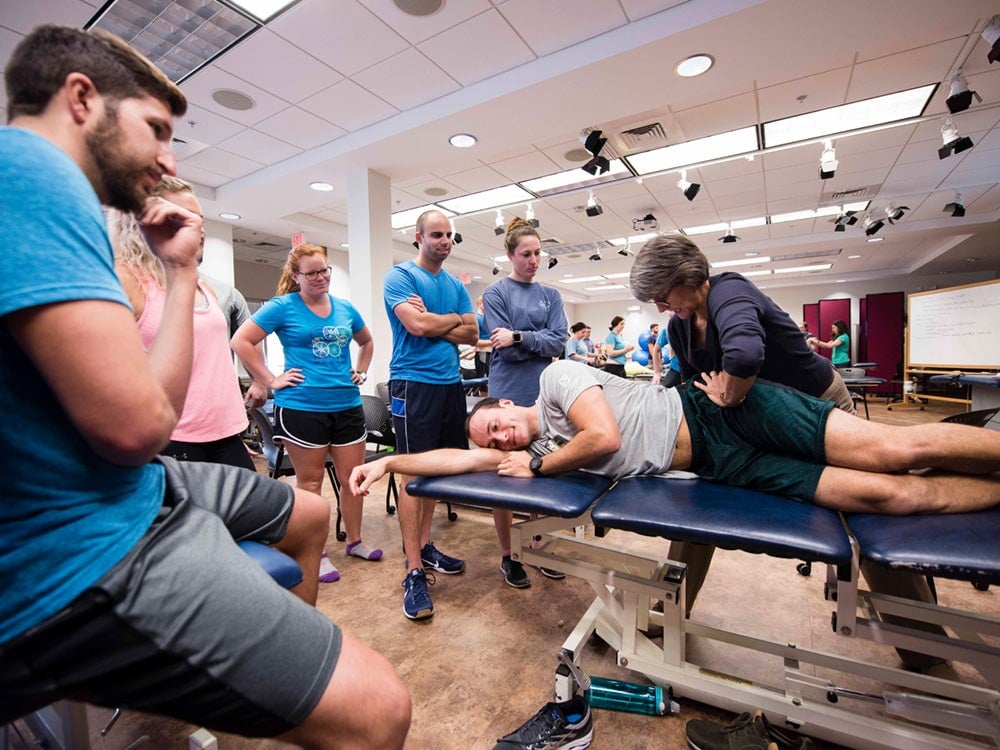
Clinical Observation
Widen your understanding of physical therapy and its relation to other health care specialties through a series of three observation-based clinical practicums held during the program’s first year.
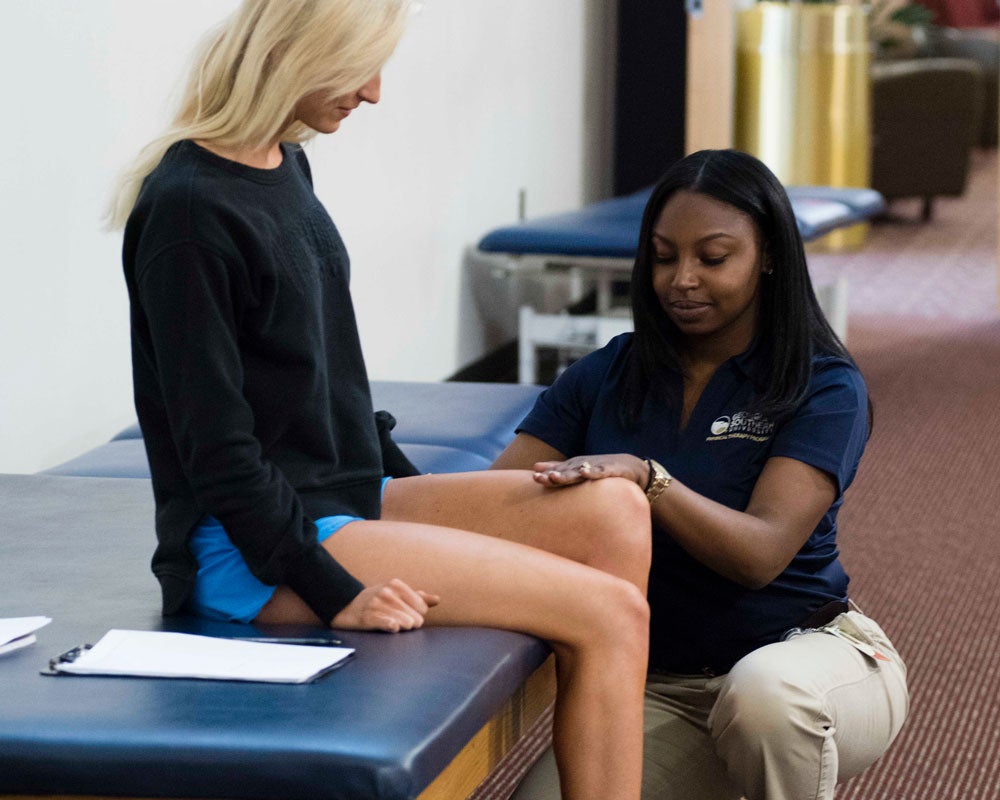
Clinical Practice
Through one eight-week and two 12-week field placements, integrate your knowledge and skills from the DPT program’s didactic and clinical components as you function as a physical therapist under experienced supervision.
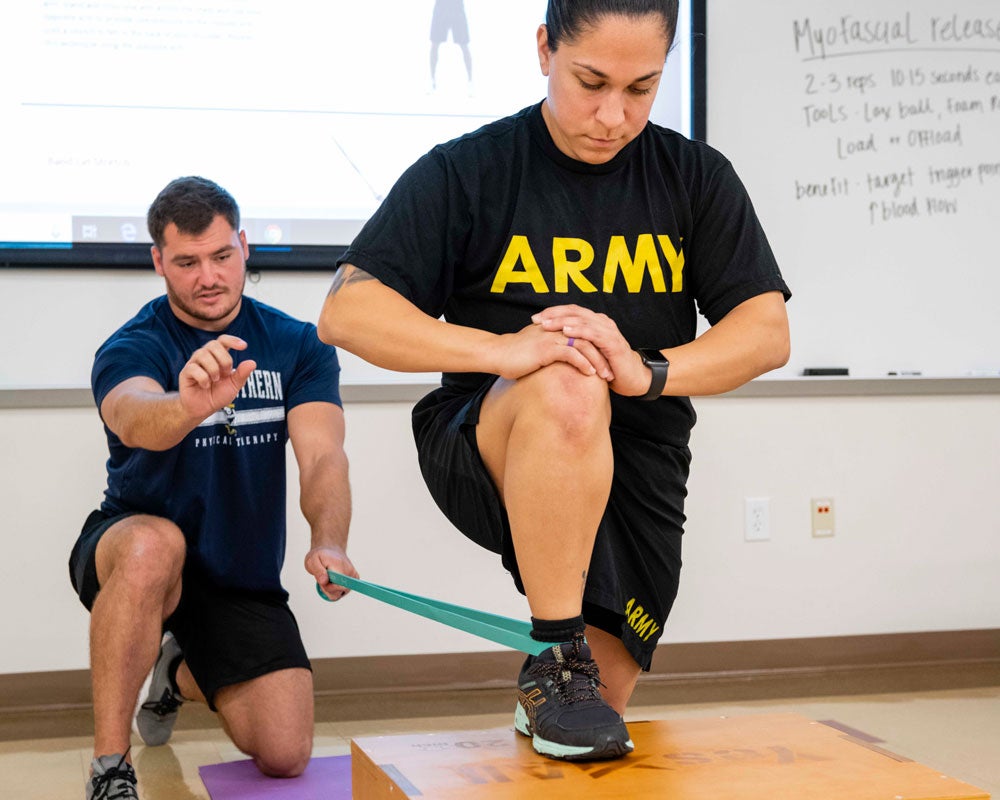
Volunteering With the Tactical Athlete Initiative
Share your knowledge of physical therapy principles with unique populations, helping instruct soldiers, firefighters, police officers and others in best practices for preventing and reducing injuries on the job.
Want to Learn More?
Explore essential information about our DPT program, including application details, accreditation status, and licensing disclosures. Gain insight into the program’s credibility and requirements to help you start your journey toward success with the knowledge you need. For more information, visit our Student Resources page and view the sections below.
Current tuition and fee charts can be found on the Georgia Southern University Bursar’s website. When reviewing tuition, click on a specific semester, then choose Armstrong Campus/Graduate Student to view the tuition rate for 12+ credit hours. The DPT program consists of nine (9) full-time semesters that are all 12+ credit hours. The total amount for in-state and out-of-state students can be used to estimate the projected total cost of the program for nine semesters.
For a comprehensive cost and affordability analysis, please visit https://em.georgiasouthern.edu/finaid/costs-affordability/.
Georgia Southern DPT Student Financial Fact SheetFor information about financial aid and scholarships, please visit Financial Aid.
Georgia Southern’s DPT is a rigorous, highly selective program, admitting 36 students to each class.
Prerequisite Coursework
Applicants to the DPT program must complete the requirements for a bachelor’s degree and any additional prerequisite coursework at a regionally accredited institution. While any major field of study is acceptable, the degree and all prerequisite courses must be completed prior to matriculation.
- At least five (5) of the eight (8) prerequisite science courses must be completed at the time of application. Applicants must have completed all of the requirements by the time they enroll in the program.
- Prospective students must have earned a grade of “C” or higher in all of the prerequisite courses. In the event that courses are taken more than once, grades will be averaged (see below for more information about GPA calculations).
- Online classes are accepted for fulfillment of prerequisite courses, including lab science courses.
- AP courses are accepted for fulfillment of prerequisite courses, but they will not be included in GPA calculations.
Applicants must demonstrate an understanding of the social, biological and physical sciences and mathematics, so that they can comprehend and integrate physiological, pharmacological, behavioral and biomechanical principles into physical therapy practice. Applicants must also demonstrate effective oral and written communication skills.
At least five (5) of the eight (8) prerequisite courses bulleted below must be completed at the time of application:
- A one-year sequence of basic (general, inorganic) chemistry with laboratories that are designed for science or health professions majors.
- A one-year sequence of general physics with laboratories (both calculus or non-calculus physics are acceptable), which are for science or health professions majors and which include mechanics, electricity, magnetism and light.
- A one-year sequence of anatomy and physiology with laboratories (either as two combined anatomy and physiology courses or with one course in physiology and one course in anatomy), which may be lower-division human anatomy and physiology courses for health professions majors or upper-division vertebrate or human physiology and comparative or developmental anatomy.
- One general biology course with laboratory. Botany, ecology and environmental science are not acceptable substitutes.
- One course in statistics, covering at a minimum measures of central tendency, probability distributions and linear regression.
Two courses in the social sciences are also required. Abnormal psychology and human development are recommended.
Applicants are also encouraged to take advanced human physiology and anatomy courses, such as exercise physiology, neurophysiology, advanced human physiology, kinesiology and/or biomechanics.
Grade Point Average (GPA)
GPAs are calculated by the Physical Therapist Centralized Application Service (PTCAS) during the application process. Applicants must meet the following GPA requirements for their application to be considered:
- Minimum overall GPA of 3.0
- Minimum physical science GPA of 3.0
Please refer to PTCAS for information about how GPAs are calculated and which courses are included in the physical science GPA. Any coursework completed after an application is submitted will not be considered in the GPA calculations, since it will not be verified by PTCAS.
No grade of “D” or “F” will be acceptable for satisfaction of the prerequisite courses. If an applicant earns a grade of “D” or “F” in a prerequisite course, he/she may retake that course only one time. No more than two prerequisite courses may be repeated with the goal of earning a passing grade. Applicants may repeat courses with grades of “C” or higher to improve their GPA, but repeated courses will be averaged in the calculation of the applicable GPA.
Required Documents
Please note: Snapshot is no longer needed for the application process.
The following documents are required to apply for admission to the DPT program:
- Complete Physical Therapist Centralized Application Service (PTCAS) application
- Official transcripts from every college and university attended
- Official Graduate Record Examination score reports
- Completed reference forms
- PTCAS application fee
- Altus Suite results: CASPer
ALL application documents, with the exception of CASPer test results, will be collected by PTCAS. Applicants do not complete the Georgia Southern University Graduate Studies application.
Graduate Record Exam (GRE)
The GRE is a requirement to apply to the DPT program at Georgia Southern. We will accept GRE scores from tests taken at testing centers and through GRE at Home.
Applicants must meet the following GRE requirements in order for their application to be considered:
- Minimum score of 146 on the verbal reasoning section
- Minimum score of 144 on the quantitative reasoning section
When requesting to have GRE scores sent to Georgia Southern University-Armstrong Campus for your PTCAS application, the appropriate codes are:
School Code: 7813
Department Code: 0619
If you use any other school code, including 5253 (the general Georgia Southern University GRE code), your GRE scores will not be added to your PTCAS application.
For students whose second language is English, a TOEFL score of at least 600 paper-based, 250 computer-based or 80 Internet-Web based may be substituted for the minimal verbal GRE score. The TOEFL score is not used in calculating a final application score during review of the applications, as there is no mechanism for converting a TOEFL score into a GRE score. As a result, the applicant’s application score may be lower than those of applicants who took the entire GRE.
The CASPer Test
Altus Suite
All applicants applying to the DPT program at Georgia Southern University are required to complete an online suite of assessments through Altus Suite (formerly called the CASPer Test), to assist with our selection process for the 2023-2024 Application Cycle.
Altus Suite consists of a two-part online assessment of non-cognitive skills, interpersonal characteristics, and personal values and priorities that we believe are important for successful students and graduates of our program. Altus Suite will complement the other tools that we use for applicant screening. Altus Suite consists of:
- CASPer: a 60-90 minute online situational judgment test (SJT)
You will register for Altus Suite for the US Professional Health Sciences test (CSP-10101).
Access www.TakeAltus.com to create an account and for more information on important dates and requirements and the Altus Suite assessments. Altus Suite results are valid for one admissions cycle.
Physical Therapy Observation Hours
Applicants should have an understanding of the scope of physical therapy practice. This understanding is best developed through observation of physical therapists in multiple types of clinical practice. For the 2023-24 admissions cycle, applicants are recommended to demonstrate a total of 75 hours of observation under a licensed physical therapist.
We acknowledge the impact of COVID-19 on health care systems and applicants’ ability to complete observation hours. As a result, we have moved from requiring 75 observation hours to recommending them. These circumstances will be considered in the review of applications. PT observation hours that have been completed or are planned should be included in the PTCAS application but do not need to be verified by a physical therapist in order to be submitted.
Reference Forms
Applicants are required to submit three references, one of which must be written by a physical therapist who has observed and supervised the applicant in a clinical setting. All of the references must be included in the PTCAS application.
Supplemental Material
All potential and enrolled students in the Doctor of Physical Therapy program must meet intellectual, physical and social competencies in order to provide safe patient care and successfully complete the program. Applicants must review the Core Performance Standards posted under the program of study.
Applicants are required to review the Core Performance Standards and answer a question about this in the Supplemental Questions section of the PTCAS application.
No supplemental fee or supplemental institution application is required.
Application Process
Thank you for your interest in the Doctor of Physical Therapy program at Georgia Southern University. This program participates in the Physical Therapist Centralized Application System (PTCAS). To learn more about the PTCAS application process and apply online, please visit the PTCAS website, ptcas.org. Applicants must review Georgia Southern University’s program page on PTCAS for program-specific prerequisites and application requirements.
Program applications for the 2024-25 admissions cycle will be available on PTCAS in mid-June 2024. The Georgia Southern University Graduate Studies application is not used.
Applicants admitted during this cycle will begin the program in May 2025. Enrollment is limited to 36 students per class.
We receive many more applications each year than we have seats available. This means that we have to turn down a large number of applicants. Students should plan to reach beyond our minimum requirements in order to increase the competitiveness of their application.
Application Deadlines
Priority Application Deadline: September 1, 2025
If an applicant’s PTCAS application (including observation hours and references), official transcripts and GRE scores are submitted by September 1, 2025, their application will be guaranteed full consideration.
GRE Deadline for Priority Applications: August 22, 2025
In order to receive priority consideration, applicants must take the GRE and request scores be submitted to School Code 7813 by August 22, 2025. Scores will be accepted from tests taken at testing centers and through GRE at Home.
CASPer Test for Priority Applications: August 26, 2025
This is the last test date for Priority Deadline applicants.
Final Application Deadline: October 1, 2025
This is the final deadline to submit your application in PTCAS. Applicants must request their official transcripts ahead of this deadline so that their application will be complete.
Final GRE Deadline: September 26, 2024
Applicants submitting their application by the Final Deadline must take the GRE and request scores to be submitted to School Code 7813 by September 26, 2024. Scores will be accepted from tests taken through GRE at Home.
Final CASPer Test: September 16, 2025
This is the last CASPer test date for applicants submitting their application by the Final Deadline.
Steps to Prepare for Application
- Review the program’s application requirements
- Attend an information session
- Request official transcripts from every college and university attended
- Request official GRE score reports to be sent to school code 7813
- Complete the CASPer test by the final test date for priority deadline or final deadline applicants
- Request three references
- Complete Physical Therapist Centralized Application Service (PTCAS) application by the priority deadline or final deadline
- Submit PTCAS application fee
Next Steps after Application Submission
- Verify that your application was submitted by the deadline. Only applications submitted by the deadline will be reviewed.
- Verify that PTCAS has received and processed all requirements (transcripts, GRE scores, references, etc.). PTCAS advises that processing may take up to 4 to 5 weeks once all required materials have been received.
- Continue to check the email account listed in your PTCAS account regularly. This is how the program and PTCAS will communicate with you about your application. It is important to take any necessary steps to prevent messages from being diverted from your email inbox.
Interviews
A personal interview is required for admission. Interviews are scheduled by invitation only. Interviews for applicants who meet the priority deadline will take place in October. Interviews for applicants who meet the final deadline will be scheduled in December.
Admission and Matriculation Process
Timeline for Decisions:
Priority Deadline: Applicants will be notified of admissions decisions by early November.
Final Deadline: Applicants will be notified of admissions decisions by late December to early January.
Candidates selected for admission must formally accept their seat and submit a non-refundable deposit. Students who matriculate in the DPT program at Georgia Southern University will have their deposit refunded during the first week of classes.
Once selected for admission, students are required to submit the following:
- Georgia Southern University Graduate Studies Application
- Verification of Lawful Presence
- Official final transcripts
- Evidence of health insurance
- Immunization records and health screening documents
- Evidence of CPR certification
Information Sessions
Information sessions will be led by DPT program faculty and include an overview of the program and the admissions process. Information sessions will be held on the following days:
- February 28, 2025 at 1:00pm
- March 14, 2025 at 1:00pm
- April 18, 2025 at 1:00pm|
- May 16, 2025 at 1:00pm
- June 6, 2025 at 1:00pm
- July 11, 2025 at 1:00pm
- August 15, 2025 at 1:00pm
- September 5, 2025 at 1:00pm
If you are interested in attending one of the above sessions, please register at the link below. All in-person information sessions will be held on the Armstrong Campus. Once registered, you will receive a parking pass for an in-person session or a link for a virtual session the week before the session.
Register for an Information Session View Map of the Armstrong CampusContact Information:
912-344-2550
pt_dept@georgiasouthern.edu
The Doctor of Physical Therapy at Georgia Southern University is accredited by the Commission on Accreditation in Physical Therapy Education (CAPTE),
3030 Potomac Ave.
Suite 100
Alexandria, Virginia 22305-3085
Telephone: 703-706-3245
Email: accreditation@apta.org
Website: http://www.capteonline.org.
If needing to contact the program/institution directly, please call Andi Beth Mincer, PT, M.Ed. at 912-344-2550 or by email at pt_dept@georgiasouthern.edu.
The Department of Clinical Sciences anticipates that graduates of the Doctor of Physical Therapy program will seek individual state licensure from the Federation of State Boards of Physical Therapy.
The Department of Clinical Sciences has determined that the required classes and educational activities of this academic program will qualify a graduate of this program to take the exam for a physical therapy license in the 50 U.S. states, the District of Columbia, and four U.S. territories: American Samoa, Guam, Northern Mariana Islands, and the Virgin Islands.
For required disclosures on whether this program satisfies the license requirements of all states and territories for a Physical Therapy license, go to www.fsbpt.org to check the requirements of your state or territory.
Georgia Southern makes every effort to ensure information about educational requirements for licensure or certification is current; however, state requirements may change. Separate from educational requirements, state licensure boards may require applicants to complete professional examinations, background checks, years of professional experience, residence requirements, jurisprudence exams, training, etc.
For more information, as well as for a list of applicable state boards, visit the Georgia Southern State Authorization and Professional Licensure Webpage.
| Skill | Standard | Example of Activities |
|---|---|---|
| Critical Thinking | Critical thinking ability sufficient for clinical judgment. | Transfer knowledge from one situation to another. Process information, evaluate outcomes, problem-solve and prioritize. Use long and short-term memory, identify cause-effect relationships. Plan activities for others. Synthesize knowledge and skills. Sequence information. |
| Analytical Thinking | Ability to process information, evaluate outcomes and problem solve. | Transfer knowledge from one situation to another. Prioritize tasks. Use long and short-term memory |
| Reading | Ability to read and understand written documents. | Reading policies and protocols. |
| Arithmetic Competence | Measuring, counting, computing. | Reading and understanding charts, digital displays, graphs. Measure time, count rates, use measuring tools. |
| Interpersonal | Interpersonal skills sufficient to interact with individuals, families and groups from a variety of social, cultural and intellectual backgrounds. | Negotiate interpersonal conflict. Respect cultural diversity in patients. Establish rapport with patients and co-workers. |
| Communication | Communication abilities sufficient for interaction with others in verbal and written form as measured by the Doctor of Physical Therapy program professional behavior evaluation, CPI and course instructors. | Explain health conditions, diagnostic and treatment procedures and initiate health teaching. Interpret and document patient responses to health status. Convey information through written and oral reports. Interact with others (patients, family members, health care workers) in person, on the phone and in writing. |
| Physical Endurance | Physical abilities sufficient to stand for multiple hours, sustain repeated movements and maintain physical tolerance for the entire work shift. | Standing multiple hours at a patient’s side during examination or therapy session |
| Physical Strength | Physical abilities sufficient to lift, support and move heavy objects. | Exert 100 lbs. of force occasionally, 50 lbs. frequently and 25 lbs. of force regularly. Support 25 lbs. of weight (e.g., ambulate patient). Lift 25 lbs. of weight (e.g., transfer patient). Move light and heavy objects. Carry equipment/supplies. Defend self against combative patient. |
| Mobility | Physical abilities sufficient to move from room to room, maneuver in small spaces and maintain physical tolerance for repetitive movements and demands of the work shift. Sustained standing. | Move within confined spaces. Sit or stand and maintain balance. Reach above shoulders and below waist. Twist, bend, stoop, or climb on stool or stairs and move quickly in response to potential emergencies. Use upper and lower body strength. Squeeze with hands and fingers. |
| Motor Skills | Gross and fine motor skills sufficient to provide safe and effective examination and treatment of patients and complete documentation. | Grasp, pick up objects with hands. Manipulate small objects with hands/fingers. Write with pen/pencil. Sit and maintain balance. Maintain balance in a variety of postures. Reach above shoulders, reach below waist. Walk with and observe patient on a variety of surfaces and heights. Reach, manipulate and operate mechanisms such as lifts, treatment tables. Self-mobility with capability of propelling wheelchairs, stretchers, heavy equipment for extended periods of time. Type on computer keyboard. |
| Hearing | Auditory ability sufficient to monitor and assess health needs. | Hear normal and faint voices. Hear faint body sounds such as blood pressure, heart beat, etc. Ability to receive spoken communication when not able to read lips. Hear auditory alarms such as monitors, fire alarms and call bells. |
| Visual Skills | Visual ability sufficient for observation and assessment necessary for safe patient care. | Visualize objects from 20 inches to 20 feet away. Use depth perception and peripheral vision. Distinguish colors and color intensity. Read and understand written documents. |
| Tactile | Tactile ability sufficient for physical assessment and equipment manipulation. | Feel vibrations to detect pulses, etc. Detect temperature. Feel differences in sizes and shapes and detect surface characteristics. |
| Smell | Detect environmental and patient odors. | Detect odors from patient (e.g. foul smelling drainage, alcohol on breath, etc.). Detect smoke. Detect gases or noxious smells. |
| Emotional Stability | Emotional stability sufficient to tolerate rapidly changing conditions and environmental stress. | Establish appropriate therapeutic interpersonal boundaries. Provide patients with emotional support. Adapt to changing environment and stress. Deal with the unexpected. Focus attention on task. Monitor own emotions. Perform multiple tasks concurrently. Handle strong emotions. |
Clinical education experiences are designed to maximize the student’s abilities to apply newly acquired patient/client/client management skills in clinical settings. The educational institution depends upon the clinical sites to provide carefully supervised learning experiences through which the student has the opportunity to apply the principles learned in the classroom. The clinical site is also a highly conducive environment in which to develop professional attitudes, values and ethics; seek practitioner role models; and to observe and participate in administrative, managerial and clinical research spheres. The problem-solving approach should form the basis of these experiences.
The student, with the clinical instructor as guide, should have the opportunity to gather all relevant information about the patient/client through examination; make clinical judgments from the information gathered; organize these judgments into a physical therapy diagnosis; establish a prognosis and goals through this process; and plan an appropriate program of intervention to attain these goals. Inherent in this approach is concern for the individual student’s needs. The clinical instructor should evaluate the student and communicate recognized strengths and weaknesses, as the student strives for excellence in performance as a physical therapist.
The professional curriculum shall prepare the student to meet the following goals:
- To develop safe, logical and effective patient/client management skills in a variety of health care settings.
- To develop effective skills for clinical teaching and lifelong learning.
- To develop a strong sense of professional values which fosters an ethical approach to the practice of physical therapy.
Students are responsible for costs of transportation, housing, meals, uniforms and other expenses associated with each clinical education experience.
For more information regarding the clinical education component of the curriculum, please refer to the Student Handbook.
| Class | 2022 | 2023 | 2-Year Average |
|---|---|---|---|
| Graduation Rate | 100% | 100% | 100% |
| Employed as physical therapists within one year of licensure | 100% | 100% | 100% |
| Licensure Examination Pass Rate | 100% passed the NPTE (90% on the first attempt) | 97% passed the NPTE (92% on the first attempt) | 99% passed the NPTE (91% on first attempt) |
Many of the clinical programs offered by the Waters College of Health Professions require a clinical internship or practicum experience to fulfill degree requirements. Pursuant to the University’s legal agreements, participants in clinical experiences are required to abide by the workplace rules of the clinical site. The University is aware of recent federal requirements that would mandate vaccination against COVID-19 for those working in certain settings, including health care. At this time, we expect that these new requirements may significantly impact our ability to locate a placement for students who remain unvaccinated. As always, WCHP will continue to make every effort to place students at clinical sites. However, please be aware that we may be unable to locate a site to accept unvaccinated students, which may cause a delay or inability to progress and complete the program of study.
Faculty Feature
Combining a wealth of clinical experience with an active research and scholarship agenda, Assistant Professor Nancy Henderson is a key part of the Soldier Athlete Human Performance Optimization program, a federal grant-funded effort designed to reduce injury rates among soldiers.
Learn More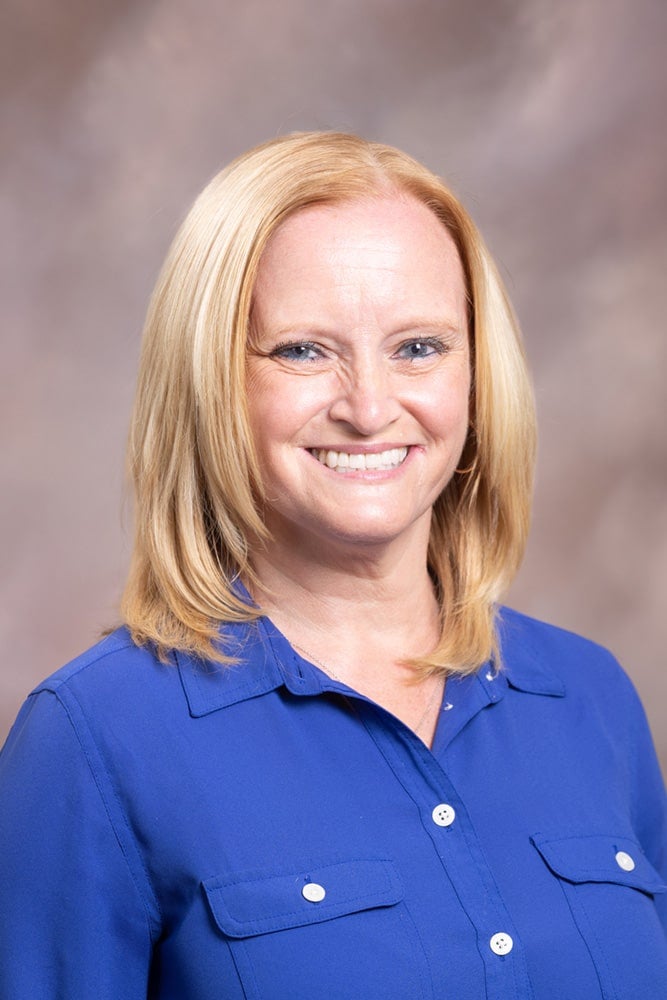
Related Programs
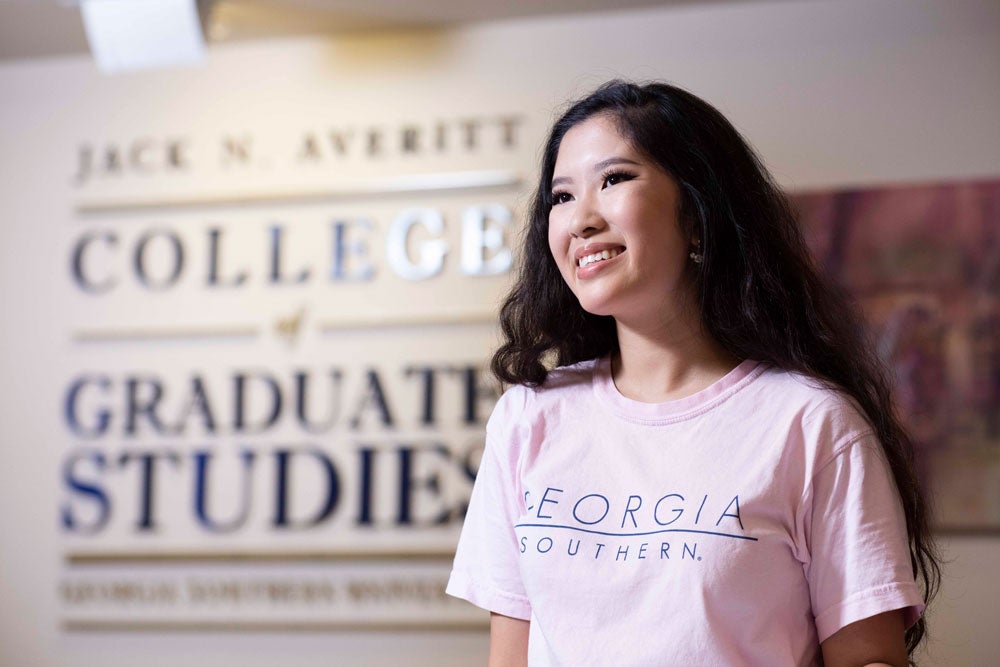
Take the Next Step
Get the training you need to help others thrive with a DPT from Georgia Southern.
Contact Us
Department of Clinical Sciences
Georgia Southern University Armstrong Campus
Department 4902
11935 Abercorn Street
Savannah, GA 31419
Phone: 912-344-2550

